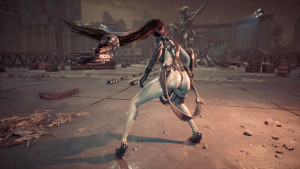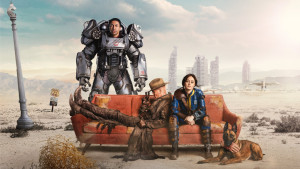Please support Game Informer. Print magazine subscriptions are less than $2 per issue
Born With No Name: A Look Back At Q*bert

As an actor, Warren Davis has achieved small roles in shows like House M.D. and Criminal Minds. Before finding some success as an actor, Davis programmed arcade games – most notably the 1982 arcade hit Q*bert. In celebration of Q*bert’s 30 anniversary, we talked with the game designer turned actor about the character’s unique history and its lasting legacy.
[Read our full retrospective on Q*bert in issue 236 of Game Informer Magazine]
Can you talk a little about how you got into the industry and how you began designing Q*bert? When you started making Q*bert did you expect it to turn it into a game?
Davis: I would say at the beginning it was a hope, but not an intention necessarily. I say that Q*bert was an evolutionary game, in that it was never planned from the beginning. It always went the next step at the right time. At the beginning it was literally just a programing exercise. I had no plans for it; it was really the feedback of other people. We were in one big room so everybody would walk around and see what everybody else was doing, and when people would see things they would go, “wow that’s cool.” When people say “that’s cool” the immediate response is, “hmm I should see what I can do with this.” Because people think it’s cool I should develop it more. It always became what’s the next step and what’s the next step, so the first step after the balls were bouncing was to have a player character moving around. The second step was, “well he is avoiding the balls then,” so now I had to write collision detection and I had to have the player die. “Well maybe he can jump off the pyramid,” okay now we have that. It was literally just “what’s the next step?”
Did anybody there at the studio or company think, “Oh Q*bert, this might be something that might have a legacy behind it?”
Yes. That was one thing that everybody thought, this was going to be huge. I didn’t because this was my first game. I was not without opinions, and I was not without ego, but I could not allow myself to think, “Oh I just created the most fantastic game ever.” No I was really making a game that I thought was good that I would want to play and one that I thought would entertain people. That was my goal and after that it’s just hope. Now before it was manufactured we had test results, because we had put it out in arcades on tests, so we knew that it was liked. We knew people wanted to play it. We knew it had replayability and the marketing people and the executives when they looked at it they said, “We think this has success written all over it.” But the coin collections numbers are what really tell you if the game is a success or not. And if it’s collecting money for people that run the arcades then that means more people want to buy them and that means we make more money because we’re building more of them. That’s how we measure success in the number of games we built because we were a manufacturer of video games.
How would you describe the office atmosphere at the time?
Laid back would be a good word. Really not a lot of supervision, especially in those early days, because we were in Bensenville it was just the video game division and it was a new division, so all of the people that had been working at Gottlieb for years, the pinball designers, the clerical people, the support staff, they were all at Northlake. Bensenville was where it was sort of a think- tank environment. The hardware designer, the people writing the tools, the artist, we were literally in one big room, we just had tables with development systems on it, and it was a very lax, laid back atmosphere. Sometimes our boss would come in and tell us, “Alright everybody you’re working too hard, let’s go and play some football,” and take us into the plant and start throwing the football around.
After Q*bert came out did the company treat you any differently?
I would say yes. I was probably given more leeway since I had sort of proven that I was allowed to explore ideas. Other people might have been allowed to explore their ideas, but management might have been more skeptical. So I would say I was given a little bit of freedom.
What was the next project right after that?
I immediately started working on Faster Harder More Challenging Q*bert. It was too soon to do a sequel, and it really wasn’t intended to be a sequel. It was really intended to be more of an adjustment to Q*bert. It was faster, harder, more challenging. We kept talking about “What do we call it?” Super Q*bert? Q*bert 2? And I said no, we’re going to call it Faster, Harder, More Challenging Q*bert. But it was literally right on the tail of Q*bert. There were probably people who had never seen a Q*bert and we were testing Faster, Harder, More Challenging Q*bert. It was too soon, I think.

You talked a little about the language. Was it just because of how the sound chip worked that you guys decided to go with this gibberish kind of language?
Yeah, exactly. The sound chip created phonemes and when you strung them together it was a very robotic sound. There were things you just couldn’t say. You couldn’t get it to say “bonus,” it always sounded like “bogus.” It was [sound designer David Thiel’s] frustration with trying to get it to say things that forced him to say “forget trying to make it say anything, let’s just make it speak random gibberish.” And it worked. It worked beautifully.
You always see the designs of Q*bert with the bubble saying gibberish. So that was born out of the fact that you guys had programmed it like that?
It’s like the chicken and the egg. I don’t recall the order. I think the bubble came first, but it could be the other way around. It could be that David Thiel came up with the gibberish first and the cartoon bubble was a response to the gibberish. In old cartoons, that’s what people would say when they were supposed to be cursing. Basically we took a tradition that came from old cartoons, that swearing with symbols and the vocal equivalent of that. But I’m not sure which came first though.
I read somewhere that there was a build where Q*bert was shooting enemies. Is that true?
This is a story that gets told wrong all the time. Jeff Lee was the artist and he created all of the characters. He might have had an idea for a game he wanted those to be in, but he was never tasked with making a game, he was never a game designer. The programmers were expected to be the game designers at Gottlieb, in general. So I was expected to come up with a game. So Jeff designed the character to shoot out of his nose, but I never considered having the character shoot out of his nose. I had no interest in doing that design, nor was I obligated to.
Do you remember any of those features that people would suggest putting in the game and you decided not to?
Not really. For every idea that somebody suggested that I took, there were about a dozen that I did not take. I do remember one though. People wanted him to jump from side to side. And I said well he can’t, there’s a wall there. If you imagine a stack of cubes in reality, you can’t reach the other side, you would literally have to jump out and around. People would suggest that and I would say well that physically doesn’t make sense. He needs to jump up or jump down. If you imagine [the game] in 3D, it makes no sense. People also wanted the joystick to be oriented like a regular joystick with up, down, left, right. And I would say that doesn’t make any sense. I you look at the play field, he can’t go straight up and he can’t go straight down. He has to go down to the left or right.
How do you feel then that now this nostalgia has kicked in and Q*bert is in movies like Wreck-It-Ralph? Is it kind of cool to see this view of a legacy of yours again?
It is exactly that. I’ve done other things, and there are a couple other things I can take ownership of, Q*bert is probably one of the things that I can take ownership of. Most of the games that I did for Williams I was part of a bigger team and I was not the lead designer. There’s always maybe a designer, and a lead programmer and I might be the senior programmer under that, so a lot of the games I was just part of a team. On Q*bert I was the designer. I wrote every line of code so I do take a lot of pride an ownership, which I share with Jeff and Dave because of their contributions. I think as a team of the three of us I think we all share that pride in that legacy and it is rewarding to know that it’s still remembered this far along, 30 years.










